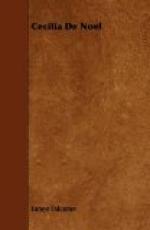His kindling glance sought the farther end of the long drawing-room; had it fallen upon me instead, perhaps that last challenge might have been less assured; and yet how bravely it became the speaker, whose wide-browed head a no less admirable frame supported. Even the stiff evening uniform of his class could not conceal the grace of form which health and activity had moulded, working through highly favoured generations. There was latent force implied in every line of it, and, in the steady poise of look and mien, that perfect nervous balance which is the crown of strength.
“And with our creed, of course, we shift our moral code as well. The ten commandments, or at least the second table, we retain for obvious reasons, but the theological virtues must be got rid of as quickly as possible. Charity, for instance, is a mischievous quality—it is too indulgent to weakness, which is not to be indulged or encouraged, but stamped out. Hope is another pernicious quality leading to all kinds of preposterous expectations which never are, or can be, fulfilled; and as to faith, it is simply a vice. So far from taking anything on trust, you must refuse to accept any statement whatsoever till it is proved so plainly you can’t help believing it whether you like it or not; just as a theorem in—”
“George,” said Lady Atherley, “what is that noise?”
The question, timed as Lady Atherley’s remarks so often were, came with something of a shock. Her husband, thus checked in full flight, seemed to reel for a moment, but quickly recovering himself, asked resignedly: “What noise?”
“Such a strange noise, like the howling of a dog.”
“Probably it is the howling of a dog.”
“No, for it came from inside the house, and Tip sleeps outside now, in the saddle-room, I believe. It sounded in the servants’ wing. Did you hear it, Mr. Lyndsay?”
I confessed that I had not.
“Well, as I can offer no explanation,” said Atherley, “perhaps I may be allowed to go on with what I was saying. Doubt, obstinate and almost invincible doubt, is the virtue we must now cultivate, just as—”
“Why, there it is again,” cried Lady Atherley.
Atherley instantly rang the bell near him, and while Lady Atherley continued to repeat that it was very strange, and that she could not imagine what it could be, he waited silently till his summons was answered by a footman.
“Charles, what is the meaning of that crying or howling which seems to come from your end of the house?”
“I think, Sir George,” said Charles, with the coldly impassive manner of a highly-trained servant—“I think, Sir George, it must be Ann, the kitchen-maid, that you hear.”
“Indeed! and may I ask what Ann, the kitchen-maid, is supposed to be doing?”
“If you please, Sir George, she is in hysterics.”
“Oh! why?” exclaimed Lady Atherley plaintively.
“Because, my lady, Mrs. Mallet has seen the ghost!”




